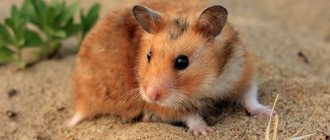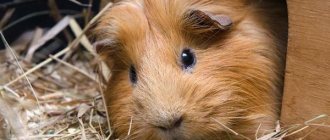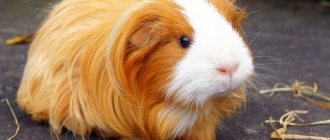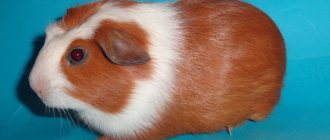Every family has its own preferences in choosing pets. Some people love dogs, others adore cats, there are bird lovers, and there are people who cannot imagine their home without a charming guinea pig.
Choosing a pet should be approached responsibly. Those who decide to have a guinea pig at home often wonder: do guinea pigs stink? In this article we will take a closer look at this issue and study reviews from the owners of these cute animals.
Features of guinea pigs
Guinea pigs belong to the order of rodents. These are cute small fluffy animals native to South America. Indian tribes consumed these animals for food. For these purposes, South American tribes domesticated guinea pigs another 5 thousand years BC. e.
The guinea pig is a herbivore. At home, these rodents can live 6-7 years. They communicate with each other using high-pitched sounds - squeaks. Pigs do not like to be alone, so it is better to buy a couple of these sociable animals so that they do not get bored.
Guinea pigs are kept as pets all over the world. They require quite a lot of time to take care of themselves. But if you look after them well, and most importantly, do it with pleasure, they will become true true friends. Returning to the question of whether guinea pigs stink, we can answer that this mainly depends on proper care. If you clean the cage on time, you can avoid a strong smell.
Toilet training
If your pet is toilet trained, cleaning is much easier and can be done less often. To prevent odors from emanating from your guinea pig's cage, it is enough to clean the toilet once a day. Since there will be no feces on the litter, it can be changed less often.
It will not be possible to accustom a pig to a specific place; you will have to adapt to it. The pet chooses a specific place and relieves itself there. Find out where it is and put a toilet there. Lay an old bedding soaked in its scent inside. You can even put litter with fecal residues. So, the pig will intuitively understand that this is exactly the place where she always goes. Some owners reward the animal with treats. It happens that a guinea pig refuses to go to the designated toilet, in which case it is moved to another place.
It is important to clean the toilet with disinfectant every time. For these purposes, you can use soda, which is poured onto the bottom, the filler is placed on top and put back in the cage.
In this way, it is possible to delay the appearance of odor in the cage of the sea warbler.
What breeds of guinea pigs are there?
In fact, there are enough breeds of guinea pigs to choose the pet that suits you best in character and appearance. The most common breeds include the following: American, Abyssinian, Peruvian, Sheltie, American Teddy, Texel, Crested, Rex, Coronet, Himalayan, Skinny. All breeds differ in coat length, color and behavioral characteristics. There are both long-haired breeds, such as the Coronet, Sheltie or Peruvian (the “furniest” breed), and short-haired ones, such as the Rex or Crested. There are guinea pigs that are very interesting in color, for example the Himalayan. Its color resembles Siamese cats. There are rodents with curly hair - texel. They look very impressive, which is why they are popular at exhibitions.
There are also completely exotic animals - this is the skinny breed. What sets it apart from others is that the animals of this breed have virtually no hair. It is present in small quantities only on the paws and face. Due to this peculiarity, some people are interested in how to maintain them, do they stink? The guinea pig (skinny breed) stinks a little less than other breeds. But this applies to the guinea pig's body odor itself. The skinny cage smells exactly the same as other breeds of cages.
Toilet training
Keeping the cage clean is much easier if the animals are toilet trained. The place for its installation must be chosen by the pet himself. It is necessary to track in which corner the filler is most often moistened and place a corner toilet there. Used bedding and feces should be placed in a new container to make it easier for the animal to navigate. When your pet relieves itself in a designated area, you need to reward it with a treat. It happens that the pig ignores the toilet, in which case it is better to move the container to another place.
Washing the toilet can be accompanied by baking soda. It is also recommended to pour baking soda into the bottom of the bowl, this helps eliminate the stench.
Litter for rodent litter should be natural. Sawdust or other wood material is ideal. Products for cats should not be used. There are fillers with odor absorbers.
Do guinea pigs stink?
Since this issue is very important for many potential breeders, we will dwell on it in more detail. After all, for some people, it is the special smell of these animals that can scare them away and discourage them from having them at home. So, do guinea pigs stink?
Every animal in nature has potential enemies, and therefore has to adapt in order to survive. Guinea pigs do not have sharp claws or deadly fangs to protect themselves from predators. Therefore, they try to make sure they remain unnoticed. To do this, they need to get rid of their body odor so that the enemy does not smell the prey. In nature, guinea pigs are very clean; they wash themselves constantly. At home, they also take care of themselves.
Of course, if you don’t take care of your pet and don’t clean its cage, the “aroma” can be quite unpleasant. The excrement of these rodents has a specific smell, just like other domestic animals. If you clean the cage regularly and keep your pet’s fur clean, the smell will be quite acceptable.
Cleaning the cage
Cleaning the pig's home should be done regularly. Weekly general cleaning is needed: replacing the filler, washing the bottom of the cage with a soap solution (baby or laundry soap is suitable) and wiping with a 10% vinegar solution. Vinegar is good at removing unpleasant odors and white stains from urine. Contaminated litter and toilets must be cleaned every day. Bowls and drinking bowls are also cleaned daily with soap. Wooden products are washed only when dirt appears, and then dried well.
It is recommended to clean the cage with a special disinfectant spray that eliminates odor. The product can be purchased in specialized stores; it will not harm the health of the animal. Before spraying, the pig is removed from the home and the filler is removed. 5 minutes after spraying, wipe the cage with a towel. After complete drying, the house is filled with clean filler. The animal returns to its place.
It is prohibited to use bleach-based products. In addition to the pungent odor, such a solution can harm the health of your pet.
If a PVC mat is used, it must be washed when it gets dirty. It is better to purchase at least 2 rugs so that you can replace one with another while the second one is drying. The bedding can be washed in a machine at a temperature of 40-60 ⁰C. The service life of a PVC mat is no more than half a year.
Who smells more, the female or the male?
And yet, like any animal, guinea pigs are also not without their natural smell. Many people wonder: who is better to choose, a female or a male? Does a male guinea pig stink? Or does the female smell more?
Of course, differences by gender determine various physiological characteristics, including the emitted odor. Males, when excited, courting a female or marking, emit a pungent odor that does not depend on the cleanliness of the cell. Each person relates to this smell differently. Many owners note that it goes away quickly and is not that strong. However, for some it is still quite unpleasant.
The female may begin to smell after giving birth due to hormonal changes. However, this phenomenon is transitory and for owners who love their pet, this is not a disaster.
Water treatments
If the pig starts to smell, some owners try to wash it in water. Remember, a pet takes much better care of itself than a human can. Some tips regarding hygiene:
- You can wash the animal only with a special product. Do not use regular shampoos or soaps.
- Bath your pig only when absolutely necessary. After the procedure, wrap in a towel until completely dry. Do not use a battery or hair dryer for this.
- Before you start bathing, you need to accustom your pet to the bath. To do this, first pour a minimum amount of water and gradually increase it over time. So that the animal understands that this is beneficial and does not become capricious, it is given a treat.
- For hygiene, you can comb and even cut a little.
- You should not wash your pig more than once a month. Leather oil, which performs a protective function, can be easily washed off.
How to care for your pet to avoid unpleasant odor
Potential breeders of these furry animals, along with the question of whether guinea pigs stink, should also be interested in the question of how to properly care for their animals in order to avoid an unpleasant odor. So, the basic rules of care:
- Correctly selected cell size. A larger home will stay cleaner longer. The size of the cage should allow the animal to allocate a separate corner where it will relieve its needs.
- Good filler. It is this that absorbs moisture and unpleasant odors, so there is no need to skimp on it. The filler must be changed regularly, avoiding excessive contamination of the rodent cage.
- Pallet cleanliness. Even if you change the filling regularly, the tray can absorb odors. Therefore, it is recommended to pay attention to the cleanliness of the tray and all accessories once a week.
- Cleanliness of feeders. Leftover water and food should not rot. They need to be removed from feeders and drinkers in a timely manner and washed with running water.
Hygiene
The smell from guinea pigs and from the cage can appear due to neglect of regular cleaning of the habitat.
Untimely cleaning leads not only to stench, but also to the development of fungal and cold diseases in your pet, and the appearance of fly larvae. If kept clean, the cage should smell like sawdust and fresh hay.
The frequency of cleaning depends on several factors:
- the size of the cage, in a very small one the pet will have to defecate literally under itself;
- the number of animals contained in it; the more there are, the more often cleaning will have to be done;
- the type of filler used, the degree of moisture absorption and odor binding depends on it.
The cage will stink if there are many animals in a small space
Cleaning the cage
A complete cleaning of the cage should be done approximately once a week. At the same time, the filler is completely changed, the cage tray, feeders and drinking bowls are washed. Laundry or baby soap is suitable for washing. A 10% vinegar solution works well to eliminate miasma and urine stains. The use of strong chlorine-based cleaning products is not recommended.
A special spray for cleaning cages, which is sold in pet stores, is very convenient. It eliminates stool odor and is safe for pets. It is enough to spray the tray with spray and after a few minutes wipe it with a clean, dry cloth. It is not necessary to wash the tray after spraying.
Medium-fraction sawdust without flavorings, shavings, hay, corn or paper filler are suitable fillers. Small sawdust generates dust and causes sneezing. Some owners use reusable PVC mat and fleece bedding, which are laid on top of the filler. The mat allows moisture to pass through, thanks to which the animal’s paws always remain dry.
You can use paper towels, napkins, toilet paper, but you will have to change them much more often. Another option is absorbent diapers. If you place a fleece or PVC mat on top of the diaper, the rodent will not be able to gut it.
To prevent guinea pigs from stinking, you need to regularly change the litter in the cage.
Daily animal care includes cleaning up leftover juicy and stale food, washing feeders and replacing litter in the toilet.
Toilet
An attentive owner will notice that the pet prefers one of the corners of its home to perform its natural needs. To make cleaning easier, you should install a homemade toilet or one purchased from a pet store in this place.
Compressed sawdust in the form of granules is ideal as a filler.
There will be no rodent smell if you change the litter in the tray daily and wash it with soda
The litter tray should be cleaned daily by rinsing it with a soda solution. Before adding fresh litter, you can also add a little baking soda to the bottom of the tray to prevent odor.
Water treatments
Pigs do not need regular bathing; they take excellent care of their fur on their own. Regular brushing with a soft-bristle toothbrush can help with care. Long-haired animals can have their fur trimmed a little to make it less dirty. But sometimes the need for bathing may arise, for example, on the recommendation of a veterinarian after certain illnesses, or when the cage is too dirty, especially for pets with long coats.
There is no need to wash your pets more than once a month. Frequent bathing washes away the natural fatty layer on the skin, which performs a protective function, and bald patches may appear.
You shouldn't wash your guinea pig often, it doesn't stink that much
They bathe the animals in warm water, filling a basin with a small amount of water. Rodents are gradually accustomed to the procedure. Avoid getting water in your ears. During the washing process and after it, you can treat your pet with a particularly tasty treat.
When Can Guinea Pigs Really Smell?
If the unpleasant odor from your pet’s body is not its individual characteristic from birth and not the influence of certain factors (for example, the condition after pregnancy in females or the conditions described above in males), this is a reason to think about the state of your pet’s health. If your pig suddenly starts to smell unpleasant for no apparent reason, and even more so if this is accompanied by any other suspicious symptoms, this is a clear reason to contact a veterinarian. Do not neglect going to him, because in this case the health, and perhaps the life of your pet, depends on you.
Nutrition
Whether a guinea pig smells or not also depends on proper nutrition. Some foods can cause indigestion and diarrhea, these include: Brussels sprouts, broccoli, crispy lettuce and others. Together with them it is better to give other varieties of cabbage, parsley, turnips, sweet peppers, etc.
When your guinea pig still smells bad and you don’t have enough time to clean it regularly, spread hay with mint, cilantro or other aromatic herbs underneath it.
Does a guinea pig stink? Owner reviews
Of course, before bringing a guinea pig into your home, responsible people will first thoroughly study all the information about these animals, including reviews from the owners.
So, does a guinea pig stink? Reviews from the owners do not hide the shortcomings of these cute animals, namely their specific smell. The phenomenon does occur, but most of all it is connected, as has been said repeatedly, with a violation of their hygiene. A certain percentage of owners claim that their pets have an odor, even despite careful hygiene. There are those who say that their pet does not emit an unpleasant odor, and if you regularly clean the cage, there will be no problems with this. Thus, the main percentage of guinea pig owners believe that if you rarely clean the rodent’s home, the “aroma” will undoubtedly be present, and if you clean everything on time, then only a small percentage of these animals will have an unpleasant odor, which is most likely due to their individual characteristics or health problems.
Feeding
The herbivore guinea pig, reviews of which can be read in our article, prefers fresh grass of all foods. At the same time, hay should always be in the pig's feeder, even if you pamper it with its favorite treat. The fact is that when eating hay, the animal develops a correct bite, grinding down the incisors, which in these rodents grow throughout their lives.
When purchasing hay at a pet store, pay attention to its smell and color: fresh hay has a light “summer” aroma of cut grass and it is usually green in color. If you smell rotten or notice a yellowish-brown color, do not purchase
Among vegetables, guinea pigs undoubtedly prefer carrots. When giving your animal a favorite root vegetable, rinse it thoroughly with warm water. Cute rodents will not refuse:
- pears;
- beets;
- dill;
- parsley;
- apples;
- pumpkins;
- Chinese cabbage;
- bananas;
- corn leaves;
- salad;
- bell pepper;
- cucumbers;
- watermelon rinds.
Citrus fruits (tangerines, tangerine peel, oranges) are strictly prohibited for guinea pigs. The pig should be fed at the same time every day. Some breeders recommend feeding their pets 2-3 times a day. But, since rodents eat often and little by little, in the morning you can put the daily amount of green food and grain into the feeder, adding hay during the day as needed. Grain makes up a third of the animal's daily diet. Owners should remember that its abuse can lead to obesity in the pig.
Minerals and vitamins are essential for guinea pigs. Reviews from breeders indicate that you can replenish their supply by buying her a mineral stone and a salt wheel. The animal will come up and bite off a piece of them when the body needs table salt or minerals.
Do hamsters smell and if so, why?
Anyone who has kept these rodents knows that an unpleasant odor from healthy hamsters does not appear immediately, but a week after cleaning. The time period can increase or decrease depending on the number of individuals in the cage. This indicates that it is time to clean and wash the cage, because healthy animals themselves do not have a smell - it is their excrement that accumulates.
To understand the reason for the unpleasant aroma of a hamster, you need to sniff the animal and the cage separately.
Why does the hamster itself stink:
- The smell came from dirty wool.
- The rodent is stressed.
- The pet is sick.
If nothing has changed after cleaning the cage, the reason is in the animal itself.
Stress in pets occurs due to various reasons - loud noises, moving the house to a new place, or close attention from cats or other animals. Some breeds of rodents can emit a scent due to the fight for territory with other males (this is what “Syrians” do)
To return the fluffy to normal, you need to seat the partners in other cages or let him get comfortable in a new place. He will calm down and the inconvenience will disappear by itself.











